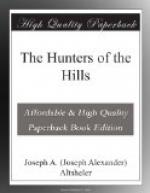Some of the hunters went out, and, the woods being full of game, they quickly shot another deer. Then the warriors still feeling in their strength that they had nothing to dread from enemies, built high the fire, cut up the deer, cooked it and made a great feast. The good feeling that existed between the Mohawks and the two whites increased. Robert unconsciously began to exercise his gift of golden speech. He dwelt upon the coming appointment of Waraiyageh, their best friend, to deal in behalf of the King with the Hodenosaunee, and he harped continually upon Champlain and Frontenac. He made them seem to be of yesterday, instead of long ago. He opened the old wounds the Mohawks had received at the hands of the French and made them sting and burn again. He dwelt upon the faith of the English, their respect for the lands of the Hodenosaunee and the ancient friendship with the Six Nations. He had forgotten the words of Dayohogo that he would be a great orator, but five minutes after they were spoken he was justifying them.
Tayoga and Willet glanced at each other, but remained silent. Young Lennox was saying enough for all three. Dayohogo did not take his eyes from the speaker, following all his words, and the warriors, lying on their elbows, watched him and believed what he said. When he stopped the chief and all the warriors together uttered a deep exclamation of approval.
“You are called Lennox,” said Dayohogo, “and after the white custom it is the only name that you have ever had, but we have a better way. When a warrior distinguishes himself greatly we give him a new name, which tells what he has done. Hereafter, Lennox, you will be known to the Ganeagaono as Dagaeoga, which is the name of a great chief of the clan of the Turtle, of our nation.”
“I thank you much, Dahoyogo,” said Robert, earnestly, knowing that a high honor was conferred upon him. “I shall try to deserve in some small way the great name you have conferred upon me.”
“One can but do his best,” said the Mohawk gravely.
But Willet rejoiced openly in the distinction that had been bestowed upon his young comrade, saying that some day it might be carried out with formal ceremonies by the Mohawk nation, and was a fact of great value. To be by adoption a son of any nation of the Hodenosaunee would be of enormous assistance to him, if he negotiated with the League in behalf of the English colonists. But to be adopted by both Onondagas and Mohawks gave him a double power.
Robert had already been influenced powerfully by Tayoga, the young Onondaga, and now the words of Dayohogo, the Mohawk, carried that influence yet further. He understood as few white men did the power of the Hodenosaunee and how its nations might be a deciding factor in the coming war between French and English, just as he understood long after that war was over their enormous weight in the new war between the Americans and English, and he formed a resolution as firm as tempered steel that his main effort for many years to come should be devoted to strengthening the ties that connected the people of New York and the great League.




